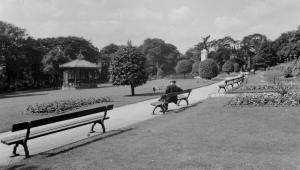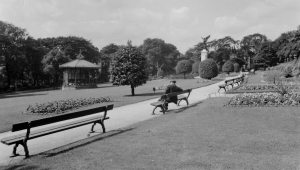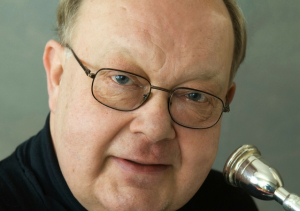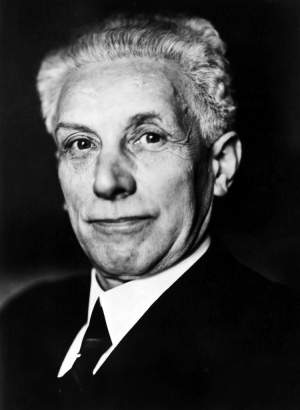
Talk Subjects
Chris Helme
Luigi Arditi (22 July 1822 – 1 May 1903) was an Italian violinist, composer and conductor.
Arditi was born in Crescentino, Piemonte (Italy). He began his musical career as a violinist and studied music at the Conservatory of Milan. He made his debut in 1843 as a director at Vercelli, and it was there that he was made an honorary member of the Philharmonic Academy.
Arditi conducted opera throughout Italy and in 1846 found himself conducting as far afield as Havana, Cuba. He visited America, where he remained for a while, conducting operas in New York, Philadelphia and other cities with the Max Maretzek Italian Opera Company until 1856.
Then, following a visit to Constantinople, he decided to settle in London but made several trips again to America with the Royal Italian Opera Company. He also conducted in Germany, and in other major European cities such as St. Petersburg, Vienna and Madrid. After 1885, he was in England, conducting at Covent Garden and in various prestigious theatres and promenade concerts in London's parks. He died at Hove, near Brighton (England). His mortal remains are buried in Hove Cemetery.
Arditi is best-known for his operas, he also wrote numerous songs and vocal waltzes, the most popular of which is "Il Bacio" ("The Kiss") which he dedicated to the Italian soprano Marietta Piccolomini.
In this show we have that famous song ''Il Bacio' played as a very familiar cornet solo. The recording dates back to 1936 with Harry Mortimer as the soloist accompanied by Foden's Motor Works Band conducted by Fred Mortimer (his father).
Enjoy the show...
Ernst Stieberitz b: 312.05.1877 d: 27.03.1945 he was a German composer, conductor and flautist.
He had his first music lessons at the music school in Camburg on the Saale River. His main instrument was the flute. He started his military career as a flautist on October 1, 1896 in the military chapel of the 8. Rheinische Infantry-Regiment Nr. 70 in Saarbrucken. In 1899 he moved to the military chapel of the Infantry Regiment Nr. 128 in Danzig (now: Gdansk). From October 1902 he studied at the Royal Music Academy in Berlin and received training as a Military Conductor. He graduated there on July 29, 1905.
On May 1, 1906 , he became bandmaster of the military chapel of the Infantry Regiment Nr. 128 in Danzig (now: Gdansk) and was therefore the youngest conductor of a military orchestra at the time.
After the First World War he returned to the position of bandmaster of the military chapel of the Infantry Regiment Nr. 128 in Danzig. In the Prussian army he was promoted to the rank of major. The city of Danzig was declared a free city and all military forces, including the chapel of the Infantry Regiment Nr. 128 had to leave the city. A police chapel with military structures was established in the free city of Danzig. It became one of the leading German police chapels. From 1920 to 1945 he was conductor at the rank of a major with the Musikkorps der Police der Frei Stadt Danzig . One of the highlights of this time was a concert with singing soloists from the Teatro alla Scala from Milan on June 20, 1936 in Sopot.
He was killed during the bombing of Danzig by the Russian Air Force in 1945. As a composer he wrote many works for concert band, including around 60 marches.
In this week’s show we feature his march Fackeltanz (Torch Dance) which is played by Besses O’ th’ Barn Band and conducted by Roy Newsome.
Michael Lind has played in the Royal Stockholm Philharmonic Orchestra since 1977 and was a member of the Philharmonic Brass Ensemble. As a musician he has performed worldwide with many famous musicians and has recorded numerous CDs from classical works to jazz. Lind has taught at Indiana University in the United States and is known worldwide as a teacher and soloist.
Lind promoted and organized the first Tuba-Swedish Workshop in 1977, the second-Tuba Workshop in 1992, the first Scandinavian Brass Symposium in 1978, the Scandinavian Brass Ensemble and the Scandinavian Tuba Jazz and Symphonic Band. Many composers have written especially for him but he has also reviewed some forty works by Nordic composers for wind instruments. Since 1993 Michael Lind has taught at the Royal Academy of Music in Stockholm.
Lind has produced a number of historic, state-of-the-art recordings that defined the highest level of tuba performance at the time of their release. His first recording, issued on the Four Leaf Clover Records in 1979, as observed by one reviewer that Michael’s recording of the famous “Carnival of Venice” … comes off as Mr Clean — I’ve never heard such impeccable technique anywhere else — on any brass instrument.” This observation had been confirmed at the First International Brass Congress held in Montreux,Switzerland, in 1976, when Lind’s performance of “Carnival” solicited a spontaneous and enthusiastic rousing standing ovation from the hundreds of brass authorities from throughout the entire world! Lind single-handedly validated the performance of music of historical significance in the evolution of brass solo repertoire. All of a sudden, everyone was proudly programming Carnival, etc., on their recitals and recordings.
No less an authority than the late great Harvey Phillips wrote the following about Michael Lind for his first recording, “Play Tuba”:
“In the summer of 1974, Michael Lind came to Bloomington, Indiana for private study. In 1977 I arranged an American recital tour for Michael. He was a tremendous success everywhere he went. Not just a musical or artistic success but a personal success as well’ Through his musical artistry Michael set new standards of performance. The flood of compositions he continues to inspire from composers throughout the world is also a part of that legacy.”One of Lind’s colleagues, the great trombonist Christian Lindberg says of Lind when he first heard him perform, ” … Michael Lind presented an appearance that created a true sensation, and the first thought that came to mind was that this was Paganini reborn with a tuba in his hand. his influence as a teacher has created a whole new generation of world-class brass players in
Scandinavia.”
From one of our great tuba artists, Robert Tucci, “Lind is a pioneer, a great performer, a great inspiration to those who composed some of the finest works in our literature and to his students. His abilities and efforts, both in regard to the objectives he set for himself and in particular, to the events and meetings he organized, were amazing.”
What better validation to receive the prestigious ITEA Lifetime Achievement Award for one of the great tuba artists of all times, Michael Lind, could there possibly be than references like the above? Lind’s official “curriculum vitae” is a fifteen-page document of incredible accomplishment and dedication to the musical art of tuba and brass performance. This short bio merely scratches the surface of all the incredible accomplishments of Michael Lind and his most worthy designation.
Courtesy of https://www.melton-meinl-weston.com/
Leon Jessel, or Léon Jessel (January 22, 1871 – January 4, 1942), was a German composer of operettas and light classical music pieces. Today he is best known internationally as the composer of the popular jaunty march The Parade of the Tin Soldiers, also known as The Parade of the Wooden Soldiers. Jessel was a prolific composer who wrote hundreds of light orchestral pieces, piano pieces, songs, waltzes, mazurkas, marches, choruses, and other salon music.
Because Jessel was a Jew by birth (he converted to Christianity at the age of 23), with the rise of Nazism in the late 1920s, his composing virtually came to an end, and his musical works, which had been very popular, were suppressed and nearly forgotten.
He was born in the eastern German city of Stettin (now Szczecin, Poland), in 1871, the son of Jewish merchant Samuel Jessel and his American wife Mary. Leon converted to Christianity in 1894 — the same year he premiered his first operetta.
Although his quite musical parents wished him to become a merchant or businessman, He was instead drawn to become a musician, and left school at the age of 17 to pursue music and musical theatre. After studying with various teachers between 1888 and 1891, He became a conductor, music director, chorus master, bandmaster, and theatre conductor working in many German cities. He settled in Lübeck, where he was Kapellmeister at the Wilhelm Theatre from 1899 to 1905, whereupon he became director of the Lübeck Liedertafel (men's singing group) association. While in Lübeck, Jessel composed numerous choral works, operettas, and character pieces.
His biggest success was the operetta Black Forest Girl, which premiered in Berlin in 1917. The opera ran in Berlin for 900 performances, and within the next 10 years was performed approximately 6,000 times in Germany and abroad.
His operettas were popular, nationalistic, and very German — Black Forest Girl was a favourite of Hitler and Himmler. Because of this, and because of his own conservative nationalistic ideology, and because his second wife Anna joined the Nazi party in 1932, Jessel expected acceptance in Germany even during and after the Nazi rise to power. Instead, he was rejected by Nazi leadership because of his Jewish descent, even though he had converted to Christianity in 1894, and performances of his works were banned in 1933. His last major work was his 1933 operetta Young Wine, and his biographer Albrecht Dümling believes that he was a victim of targeted boycott measures as early as 1927.
In 1937 he was forced out of the State Music Institute, and recordings and distribution of his works were prohibited. In 1941 a house search turned up a 1939 letter to his librettist William Sterk in Vienna, in which Jessel had written: "I cannot work in a time when hatred of Jews threatens my people with destruction, where I do not know when that gruesome fate will likewise be knocking at my door." On December 15, 1941 Jessel was arrested and delivered to the Gestapo in Berlin. He was tortured by the Gestapo in a basement of the Police Bureau and subsequently died on January 4, 1942 in the Berlin Jewish Hospital.
Lieut. Colonel Charles Skinner, b: 28.9.1911, Bishop’s Stortford, Hertfordshire
d: 24.02.1978, West Wickham, Kent, was a third-generation salvationist who first learned to play the cornet at the age of seven. His father, the then bandmaster at Bishop Stortford corps, was his first music teacher.
When, on leaving school, he came to work at International Headquarters (IHQ), he had the opportunity to further his musical experience by assisting well-known London corps bands as well as the International Staff Band. He also had the privilege of touring Sweden with the Tottenham Citadel Band about this time.
He later came under the direction of Arthur Goldsmith, who gave him great encouragement with his first efforts at composition. During this time, he played the Soprano Cornet in the men’s social work band, taking part in recordings and playing solos.
A self-taught musician, Charles Skinner studied theory and counterpoint while on the train, commuting to and from the office. He was often seen bent over textbooks, for not only did he study music theory he also studied shorthand. During this time, he also learned to play the pianoforte, concertina and piano-accordion, for which instruments he showed great aptitude.
Throughout the thirties, he was submitting music for publication, particularly in The Musical Salvationist, though the brass journals were soon to benefit from his compositional skills. His first composition, ‘I love the Lord’, won a prize, and was published in 1933.
He was appointed Cadet Sergeant-Major in 1934and went on to play Solo Cornet in the Liberators’ Cadets Band.
In 1945 he was appointed to the International Music Editorial Department, as a successor to Eric Ball. He was to serve there for a total of 22 years, eight of them as Head.
He was an instructor at the Army’s first English band camp, held at Hadleigh, in 1947. He was also a guest at the Adelboden music camp in Switzerland for several years, which he greatly enjoyed.
He was a member of the International Staff Band for 25 years. This included being Deputy Bandmaster, and, later, Executive Officer. He was the first playing member of the band for 50 years to be given that appointment. He had previously been Bandmaster at Regent Hall for a short time until a sudden bout of ill health caused him to give up the responsibility; he afterwards served as Deputy to Bandmaster Ken Cook.
His musical legacy will be for the many beautifully crafted songs within our vocal repertoire but it is also important to remember that his brass compositions and transcriptions, which include the strong Tone Poem ‘Heroes of the Faith’ which is this week’s show.
Featured bands include:
Eikhanger-Bjorsvik Musiklag. Cory Band, Brass Band Burgermusik Luzern, Paris Brass Band, Brighouse & Rastrick, Valaisia Brass Band, Brass Band Regensburg, Wardle Academy Youth Band, Catch Basin Brass Band, BMI Talents and the European Youth Brass Band.
World of Brass Recording: DOY CD394
Louis Joseph Ferdinand Hérold (28.01.1791 – 19.01.1833), was a French operatic composer who also wrote many pieces for the piano, orchestra, and the ballet. He is best known today for the ballet La fille mal gardée and the overture to the opera Zampa.
Louis J. F. Hérold was born in Paris, the only child of François-Joseph Hérold, a pianist, teacher, and composer, and Jeanne-Gabrielle Pascal. At the age of six, he attended the Hix Institute and excelled in his studies. While there, he also took musical theory, at the age of seven, he played the piano and composed some piano pieces.
His father did not intend for him to follow a musical career, but after his father's death in 1802, he could finally pursue this avenue. He enrolled in the Conservatoire in 1806 and was schooled in piano by Louis Adam (father of the composer Adolphe Adam) during these times at the Conservatoire became a virtuoso on piano and violin.
In 1810 he won first prize in a piano competition with one of his own compositions. One of the judges remarked: "This piece is full of flaws, but I see great things ahead for him". He progressed so far in his studies that in 1812 he won the Prix de Rome. In Rome, during the spring of 1813, he composed his first symphony, which all Prix de Rome winners were required to do in order to show their progression in studies, and also completed the last of his four piano concertos.
In 1815 he moved from Rome to Naples for health reasons. While there he composed several pieces including his second symphony and three string quartets.
On May 3, 1831, one of his most famous operas, Zampa, premiered. This opera enjoyed much success in France and Germany where it is still occasionally staged today. He followed up his success with Zampa with contributions to La Marquise de Brinvilliers, a collaborative effort of many composers including François-Adrien Boïeldieu and Daniel Auber. Two names are well known in brass bands for their overtures.
Hérold died of tuberculosis which he had long suffered. Hérold's opera Ludovic, which had not been completed, was finished by Fromental Halévy.
Hérold was buried in Paris. The house at 10 rue Hérold is Hérold's birthplace. The street was named in his honour in 1881.
In this week’s show, we feature the Clog Dance from his ballet La Fille Mal Gardee.
Manfred Obrecht was born in 1958, at the age of 16 he began his studies in trumpet and orchestral conducting at the music academies in Bern and Basel.
Since 2001 Manfred Obrecht has been guest conductor of the London Concert Symphony Orchestra, which performs the great works of classical music with his 80 musicians. As a permanent guest conductor, he gives concerts at home and abroad with the Baden-Baden Philharmonic and the Filarmonica Italiana Orchestra from Piacenza. Manfred Obrecht is conducting with the Slovak Philharmonic in Bratislava, the Stuttgart Symphony Orchestra, the Southwest German Philharmonic and the Württemberg Philharmonic. He is chief conductor of the international brass band Classic Festival Brass.
He regularly conducts performances of the great symphonic choral works at the Moscow Cathedral Choir, the Coro dell 'Opera di Parma, the Arcis-Vocalisten Munich, the choir of the Biel Solothurn Theater, the Zurich Concert Choir, the Classic Festival Choir, the Coro La Compagnia Rossini, the Birnauer Kantorei, the Konzertchor Audite Nova, the Konzertchor Pro Arte Bern, the Bach Collegium Zürich, the Konzertchor Canto Classico, the Konzertchor Klangwerk Luzern, the Kammerchor Chur, the Akademisches Chor Zürich, the choir of the University of Lucerne, the Aurelius Boys' Choir and the Lucerne Cantore.
The artistic collaboration connects Manfred Obrecht with outstanding musical personalities such as Regula Mühlemann, Rachel Harnisch, Ivana Rusco, Noemi Nadelmann, Tine Thing Helseth, Dimitri Ashkenazy, Gabor Boldoczki, Sergei Nakarjakov, Reinhold Friedrich, Alessio Allegrini and many other world-famous interpreters.
Manfred Obrecht plans and implements concert projects with stars from the theater and film business. Sky du Mont, Barbara Wussow, Christian Kohlund, Patrik Fichte, Siegfried Rauch, Günther Maria Halmer and Hanspeter Müller-Drossaart were among his guests at the KKL Luzern.
Manfred Obrecht is Artistic Director of Obrasso Classic Events AG.
From 1981 - 2009 Manfred Obrecht was the chief conductor of the Oberaargau
Brass band, promoting musical talent. Under his direction, the young musicians won national and international prizes and awards.
A successful collaboration connects him as a conductor with renowned ones
English wind formations such as Yorkshire Building Society Band, Brighouse & Rastrick Band, British Leyland Band, Desford Colliery Band, Flowers Band and Grimethorpe Colliery Band.
We are featuring two tracks on this week's show where he is the conductor.
Talks Available
All the presentations are timed to last up to an hour except where shown - questions are gladly taken after the presentation. All have been presented to male, female and mixed audiences of varying age groups.
-
A Postcard from the Past
The Sunny Vale Pleasure Gardens, Halifax - Yorkshire’s Alton Towers of the…
-
All in a Days Work
Reminiscences from 30 years in the Police Service – (humorous lecture presentation)…
-
Legends from the world of Brass Bands
(Info-tainment – digital slides & music) – 1 hour presentation.
-
A Week in May
A story based on the Murder of Lord Frederick Cavendish (of the…
- Memories of Christmas Past
-
The Road to Publication
In 1979 I was asked to assist in presenting a series of…
-
How we used to live
We have all seen and experienced changes in our lives. Bring back…
- Holiday Memories from the Past
-
Other Folks Rubbish (Not suited to a Zoom presentation)
With a local history theme… – (thought provoking humorous lecture presentation) –…
- So you want to be a Pirate ? - The life of a Pirate was not all that it seemed
- Superstitions, New Year Resolutions and the Origins of St Valentine's Day
- Brighouse at Work
-
Sorry but I am not able to accept any more face to face talk bookings at the present time ONLY ZOOM TALKS
































